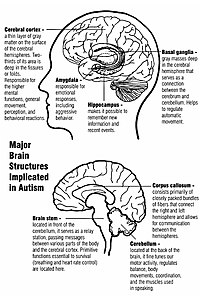
Photo from wikipedia
Fragile X syndrome (FXS) is a neurodevelopmental disorder caused by a single genetic mutation in the FMR1 gene. Mutations in the FMR1 gene are the largest monogenic cause of autism… Click to show full abstract
Fragile X syndrome (FXS) is a neurodevelopmental disorder caused by a single genetic mutation in the FMR1 gene. Mutations in the FMR1 gene are the largest monogenic cause of autism spectrum disorder (ASD), and thus both disorders share many of the same cognitive and behavioral impairments. There is increasing evidence suggesting that dysregulated immune responses play a role in the pathophysiology of ASD; however, the association between FXS and altered immunity requires further investigation. This study examined whether Fmr1 knockout (KO) and wild-type mice on a FVB/NJ background strain had altered cytokine expression at baseline levels in the hippocampus. Results showed Fmr1 KO mice to have decreased proinflammatory cytokine hippocampal mRNA expression, specifically interleukin (IL)-6 and tumor necrosis factor-&agr;, compared with wild-type mice. However, no differences were detected in the expression levels of IL-1&bgr;, MCP-1, interferon-&ggr;, or IL-10. Despite the high comorbidity between FXS and ASD, these results suggest that the Fmr1 KO mouse does not mimic the increased proinflammatory cytokine expression commonly found in ASD mouse models and patients. Further investigation of the immune profile of the Fmr1 KO mouse is critical to understand whether this deficiency of cytokines in the hippocampus is indicative of a broader immunologic deficit associated with FXS.
Journal Title: NeuroReport
Year Published: 2017
Link to full text (if available)
Share on Social Media: Sign Up to like & get
recommendations!